COURSE ACCREDITATION GUIDELINES IN NIGERIAN TERTIARY SCHOOLS
• Academic programmes in the universities are regulated by the National Universities Commission (NUC).
• The programes in the polytechnics and colleges of technology are controlled by the National Board for Technical Education (NBTE).
The National Universities Commission (NUC), on regular basis, conducts accreditation exercise for all programmes in the universities using experienced senior academic staff.
Statutory professional bodies e.g. Council for the Regulation of Engineering in Nigeria (COREN), Institute of Chartered Accountants of Nigeria (ICAN) also ensure maintenance of standards in tertiary institutions through a system of visitation, accreditation and re-accreditation of programmes.
Objectives of Accreditation
1. Promote and foster good quality post-secondary training for the production of high quality and skilled graduates;
2. Ensure parity of standards in all programmes offered by universities;
3. Certify to the Nigerian and community that the programme offered by an institution has satisfied the minimum educational requirements as laid down by the NUC, NBTE, NCCE, etc.; and
4. Provide counsel and assistance to the managers of institutions, where necessary.
Programme Approval
1. All Nigerian tertiary institutions require prior approval of the appropriate regulator (NUC, NBTE or NCCE) before establishing new programmes.
2. NUC, NBTE and NCCE have developed guidelines and application formats for this purpose.
3. Adequacy of preparedness is assured through resource assessment then granting of approval follows.
Accreditation Process
1. Fresh programmes that are just matured for accreditation
2. Re-accreditation is for:
3. Programmes that earned full accredited status (5 years) whose accreditation will soon lapse
4. Programme that earned interim status (2 years).
5. Programmes that earned denied accreditation status (1 year).
6. The NUC, NBTE or NCCE selects senior academic experts from different universities, polytechnics and colleges as the case may be.
7. Usually two persons are selected to assess each programme to ensure peer review of the each discipline.
.
FURTHER DETAILS ON UNIVERSITY ACCREDITATION BY THE NUC.
Instruments used in the NUC Accreditation Exercise include:
1. The Minimum Academic Standards (MAS) documents constitute the basis for assessment.
2. The formats for undergraduate accreditation are:
3. Self Study Forms (SSF)
4. Programme Evaluation Form (PEF)
5. Accreditation Panel Report Form (APRF)
6. Accreditation Revisitation Form (ARVF)
7. Manual on Accreditation Procedure (MAP)
The Self Study Form (SSF )
This is divided into two parts: Section ‘A’ and Section ‘B’
1. Section A – This is a general information section on the university as a whole,
2. Section B – This section deals specifically with the programme to be accredited by the panel.
Academic content
1. This covers the philosophy and objectives of the programme,
2. The curriculum,
3. Compliance with the guidelines on quality of admissions,
4. Academic regulations,
5. Standard of test and examinations,
6. Interview with the students, interaction with staff – both academic and non-academic,
7. Practical/project work,
8. External examination system,
9. Engineering drawing practice and adequacy of lecturers.
Staffing
1. Teaching, technical and administrative staff.
2. 1:15 (staff: students).
3. The documents further provide the proportion of each category of staff to ensure quality.
4. Staff development programme and staff contribution to the engineering industry.
5. Table 1 show the academic staff structure.
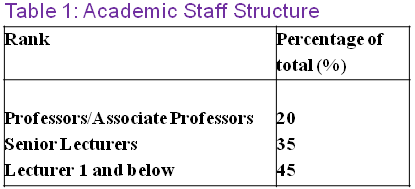
Physical facilities
1. Classrooms/lecture threatres,
2. Office accommodation,
3. Library facilities,
4. Funding and feedback from employer.
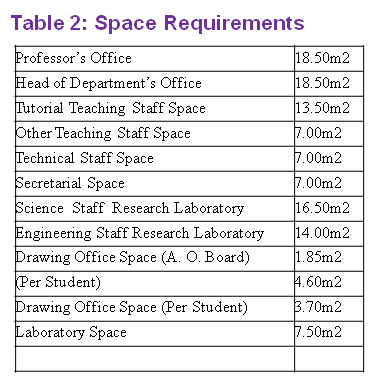
--
Funding
1. Source of funding is usually provided,
2. the panelists assess the adequacy or otherwise of the allocation.
Feedback from employer.
1. Employers’ rating
The Programme Evaluation Form (PEF)
1. This form is usually completed by the relevant panel member.
2. The information contained in this form provides the basis for the scoring of the programme to be accredited.
3. It is used for the preparation of statement of fact about the programme.
Accreditation Panel Report Form (APRF)
This form is usually completed for each programme that is being accredited.
1. The accreditation status awarded to the programme and the summary of scores will be entered into the appropriate space in the form.
2. APRF is submitted to the university officials at the end-of-visit meeting with the Vice-Chancellor for his/her comment(s).
Summary of scores in APRF
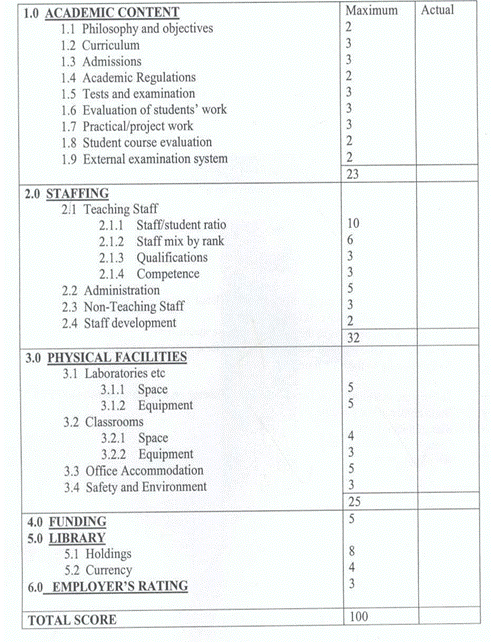
-
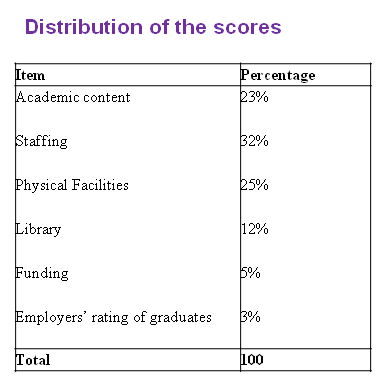
Accreditation Status
1. The accreditation status of any programme or discipline will be based on the degree to which the resources on ground meet the minimum academic standards.
2. At the end of an accreditation exercise, a programme can earn full, interim or denied accreditation.
3. To qualify for full accreditation a programme must score above 70% in each of four major areas; that is academic content, staffing, physical facilities and library facilities.
4. For interim accreditation 60-69.9% while denied accreditation the score is 59.9% and below.
COREN Accreditation
1. The COREN accreditation exercise follows the same principle as NUC with minor changes in the membership of the panels and in the overall distribution of the scores.
2. The basis of COREN accreditation is the NUC MAS.
3. Apart from experts from the university, COREN invites experts from industry as panel members.
4. The distribution of the overall scores is along seven (7) criteria weighted (percentage) as indicated below in Table 5.
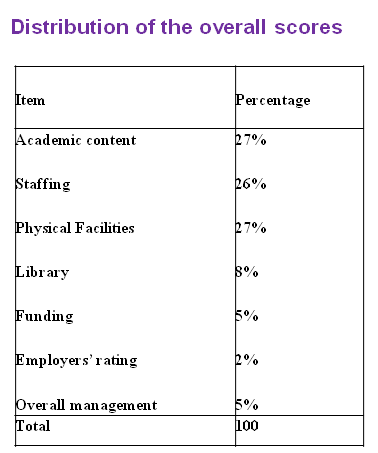
The accreditation status is similar to that of NUC.
Source: Funso Falade, PhD, Department of Civil and Environmental Engineering, University of Lagos, Akoka, Lagos. E-mail: ffalade@hotmail.com
--
Contact: Excellence and Education Network, Email: info.exced@gmail.com, Telephone 234-7026259590, 234-7034554494


